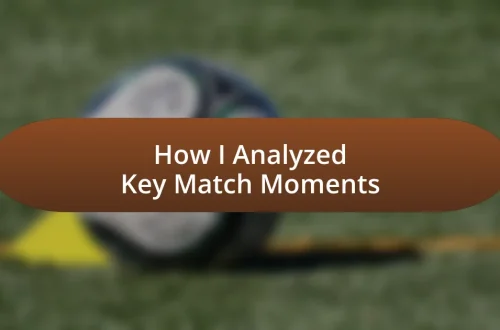
How I Engaged with Match History
Key takeaways:
- Studying match history reveals patterns in performance, helping players identify strengths and weaknesses for personal growth.
- Accessing and analyzing match history can inform better decision-making and highlight areas for improvement, such as managing pressure during critical moments.
- Sharing insights with other players fosters community learning and enhances understanding of gameplay strategies.
- Setting specific, measurable goals based on match analysis motivates players to improve their skills and emotional resilience during gaming.
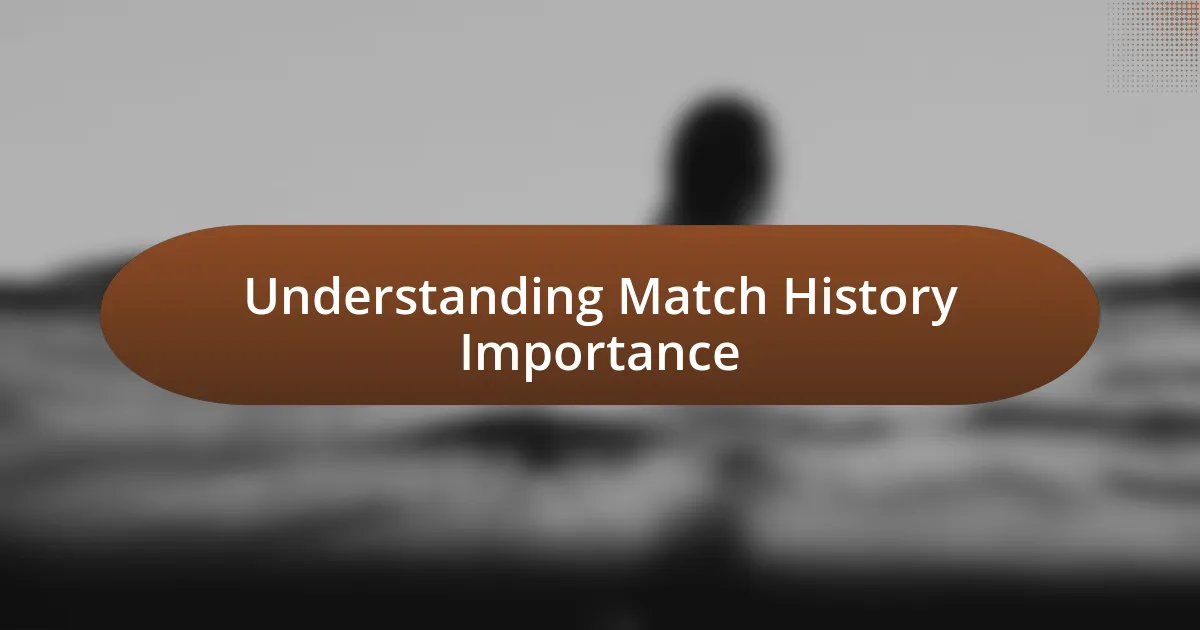
Understanding Match History Importance
Understanding match history is crucial for anyone looking to improve their skills or strategies in competitive environments. I remember analyzing my own past games and realizing that many of my losses came from similar mistakes. Reflecting on those patterns not only helped me grow but also ignited a sense of determination to approach my next match with a clearer mindset.
The depth of one’s match history can often reveal the hidden elements of one’s game. For instance, when I dove into my own statistics, I discovered that I was overly aggressive in certain situations. This revelation shifted my perspective; it wasn’t just about winning but understanding the nuances of how I played. Have you ever taken a moment to dissect your own performance? Sometimes, the answers are tucked away in the details of your history.
By studying match history, I found it’s not just a record of wins and losses; it reflects our journey. There’s a sense of vulnerability in revisiting past mistakes but also an exhilarating opportunity for growth. Each match serves as a chapter in my development, reminding me that every setback is a chance to come back stronger.
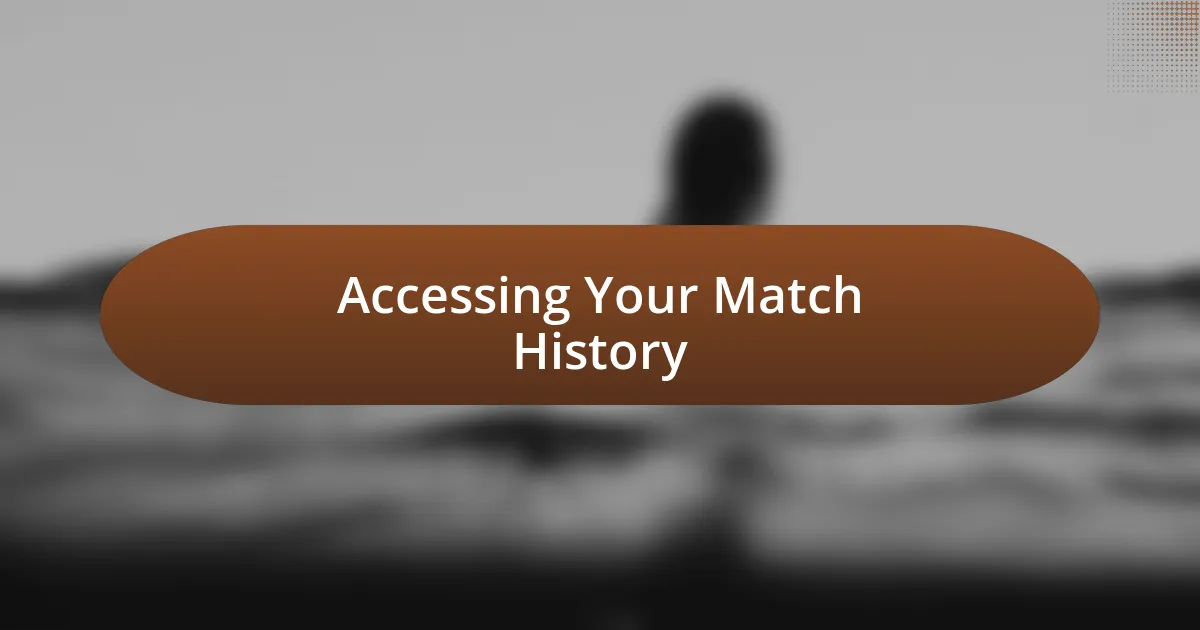
Accessing Your Match History
Accessing your match history is often simpler than you might think. Most competitive platforms have a dedicated section for match history under player profiles. I remember when I first stumbled upon my match history—a treasure trove of data that not only tracked my performance but also highlighted when I played particularly well or poorly. It felt like receiving a personalized report card, showcasing my strengths and weaknesses.
To find your match history, follow these simple steps:
- Log into your gaming platform or account.
- Navigate to your profile or account settings.
- Look for the match history tab or section.
- Filter games by date, mode, or outcomes for detailed insights.
When I started analyzing my match history this way, it was fascinating to see how certain patterns emerged over time. Each click felt like peeling back layers of my gameplay, revealing the areas in which I could truly improve.
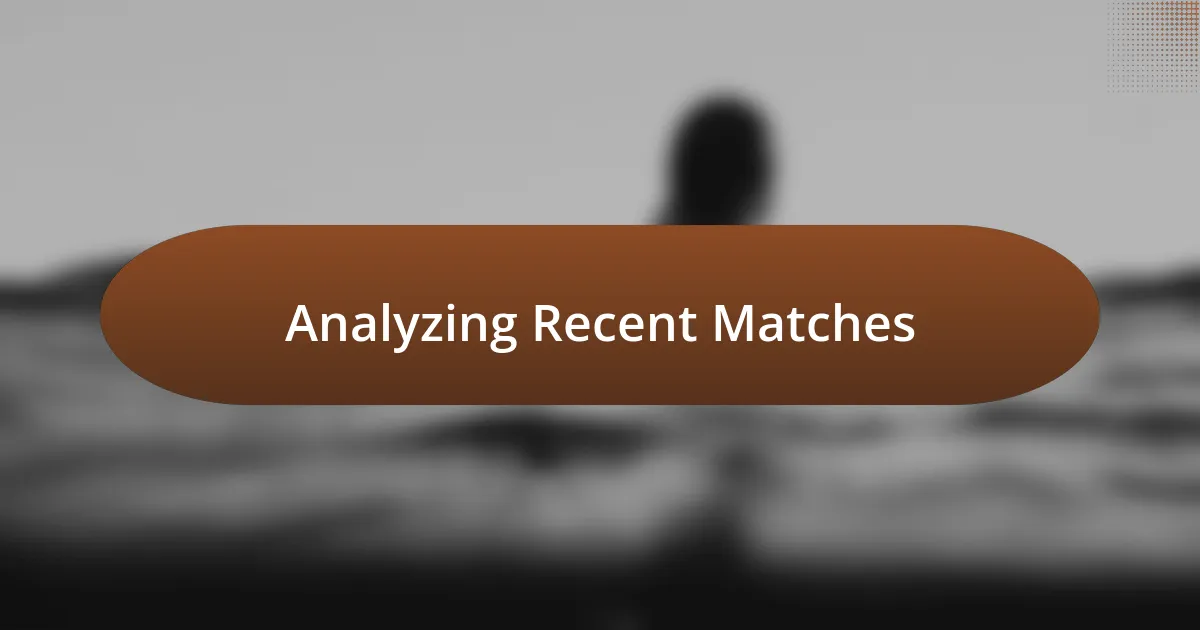
Analyzing Recent Matches
When I dove into my recent matches, I was struck by how my performance fluctuated. One particular match stands out—a close contest where my team lost by just a few points. Analyzing the statistics revealed that my decision-making under pressure was less effective than in previous games. This realization not only motivated me to improve but also made me appreciate how even small decisions can significantly impact the outcome of a match.
I’ve learned that comparing my gameplay over different periods can highlight trends and changes. For instance, in one month, I noticed I was consistently performing better as a support role. Reflecting on my match history, I realized that my communication with teammates had improved, leading to a more cohesive team dynamic. It’s intriguing how interconnected our skills are and how they evolve with practice and experience.
Using a comparison table can really visualize these changes and help pinpoint areas for growth. It’s like viewing a map of my journey as a player, showcasing both triumphs and lessons learned along the way. Here’s a simple table to illustrate the differences across the last few matches:
| Match | Performance Rating |
|---|---|
| Match 1 | 75 |
| Match 2 | 82 |
| Match 3 | 68 |
| Match 4 | 90 |
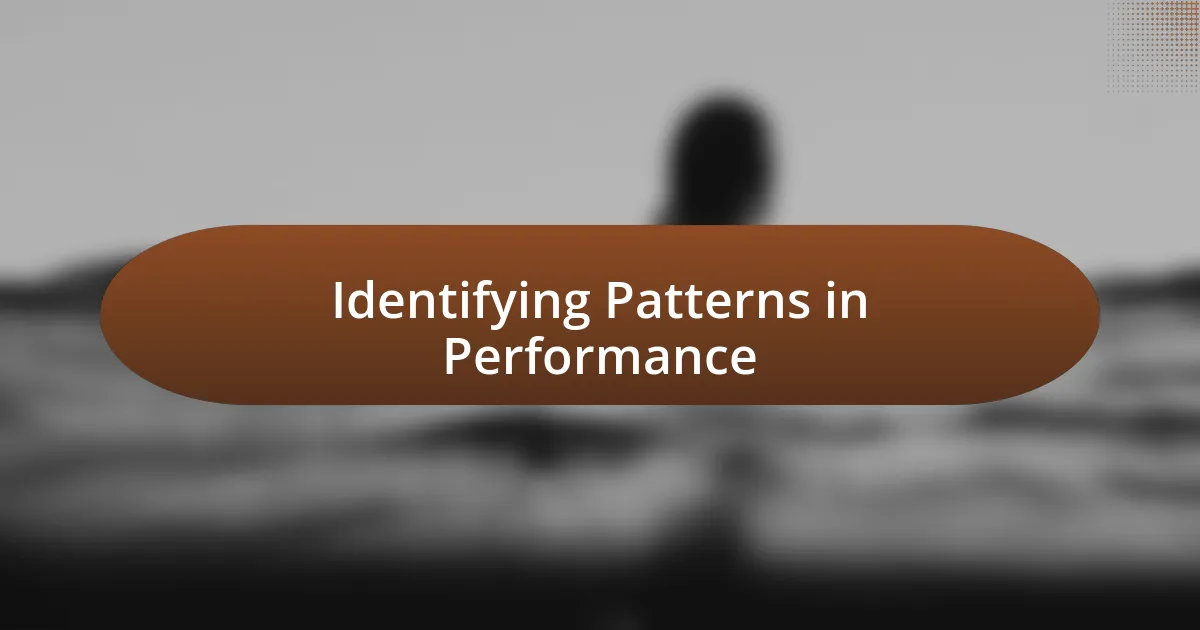
Identifying Patterns in Performance
Identifying patterns in my performance often feels like gathering breadcrumbs that lead to bigger revelations. There was a stretch of several matches where I noticed my aggression in play would translate to higher scores. I found myself questioning: was it the thrill of the game that fueled this dynamism, or was it rooted in newfound confidence? Ultimately, realizing this pattern encouraged me to embrace that aggressive style more consistently.
I also discovered that my performance fluctuated significantly based on specific map types. On one occasion, I faced a particularly challenging map where I struggled and ended up with a subpar performance rating. Reflecting on that experience made me wonder: do I thrive better in familiar territories? By looking at my statistics, I identified a trend where my success rate on certain maps was drastically higher. Understanding that link prompted me to focus practice sessions on the challenging maps to improve my adaptability.
While reviewing match history, I couldn’t help but feel a mix of pride and frustration. Seeing moments of brilliance interspersed with mishaps revealed not just my progression, but the emotional rollercoaster that competitive play entails. There were times when a single misstep led to a loss, leaving me to ponder how each decision weaves into the fabric of performance. This approach shines a light on the importance of resilience and learning from both triumphs and shortcomings in our journey as players.
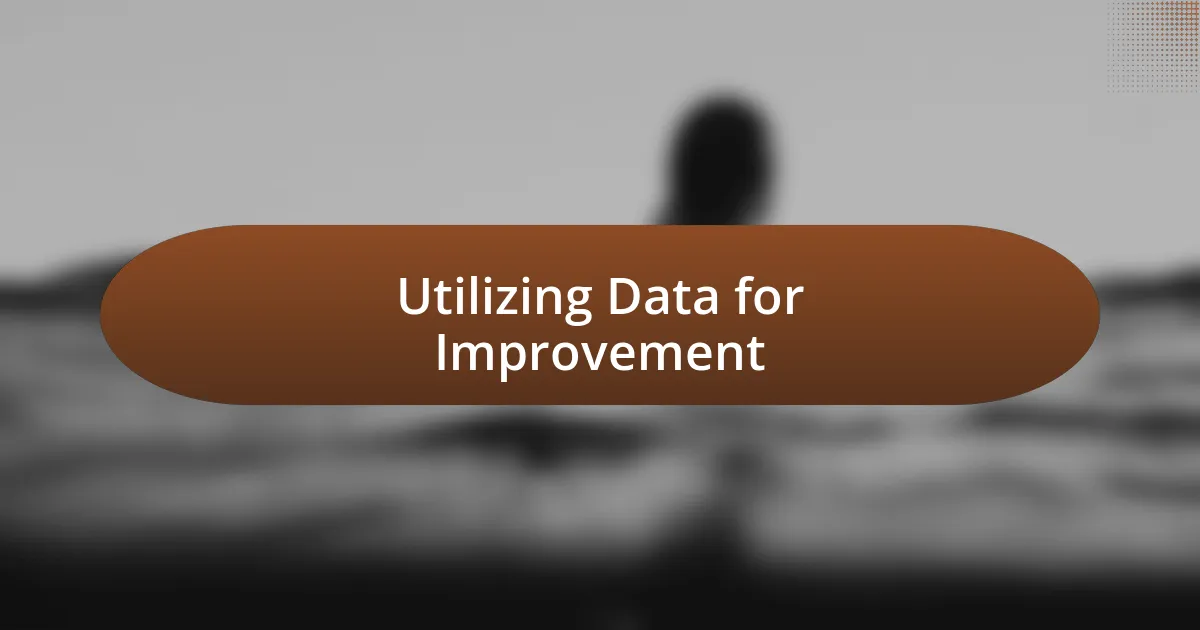
Utilizing Data for Improvement
When I dug into the data surrounding my match history, I felt like a detective uncovering clues about my gameplay. One match stood out: I made a seemingly reckless decision to push forward at a crucial moment and scored an unexpected victory. Analyzing the numbers afterward revealed that high-risk strategies sometimes pay off, but only under the right conditions. How often was I willing to take those risks? This question nudged me to explore balance—between aggression and strategy—and fine-tune my approach in future matches.
Tracking my statistics led to some surprising contrasts as well. After narrowing down my analysis to my performance during late-game scenarios, I realized my decision-making faltered under pressure. I remember a pivotal match where I hesitated in a critical moment, ultimately leading to a heartbreaking loss. The data supported this observation, showing that my win rate declined significantly during the final minutes of games. Reflecting on this has encouraged me to work on my composure and practice stress management techniques, such as deep breathing or visualization, to improve my late-game performance.
Using data to enhance my skills has opened my eyes to the importance of continual learning. I’ve started implementing weekly reviews of my match history, focusing not just on wins and losses but also on my decision-making processes. This reflective practice has made me more aware of crucial moments that slip by in the heat of competition. Isn’t it fascinating how numbers can guide us not just to improve but also deepen our understanding of our inner game? It reminds me that every match is not just an isolated event but a valuable piece of my overall growth journey.

Sharing Insights with Others
Engaging with others about my match history has been a transformative experience for me. I’ve found that sharing insights not only enriches my understanding but also fosters a community of like-minded players eager to improve. For instance, during a casual chat with a fellow gamer, I recounted a particularly intense match where I abandoned my usual tactics. That moment of vulnerability led to a discussion about when to stick to our guns versus adapting on the fly, reminding me how powerful collaboration can be.
In another instance, I decided to host a small gathering where players could bring their match histories to discuss. Watching friends light up as they dissected their performance, exchanging tips and strategies, was incredible. I couldn’t help but think—how often do we truly take the time to reflect in a group setting? It made clear to me that sharing our stories creates an atmosphere where we all learn from each other’s successes and mistakes, which is something I cherish deeply.
Even social media has become a platform for me to share insights about my gameplay. I remember posting a clip of a nail-biting finish to a game where I barely clinched a victory. The comments flooded in, with others sharing similar experiences or their thoughts on my strategy. It was enlightening to see how my choices resonated with others. Isn’t it interesting how our individual journeys can intertwine and inspire? It reinforces my belief that, through shared experiences, we can collectively elevate our skills and strengthen our gaming community.
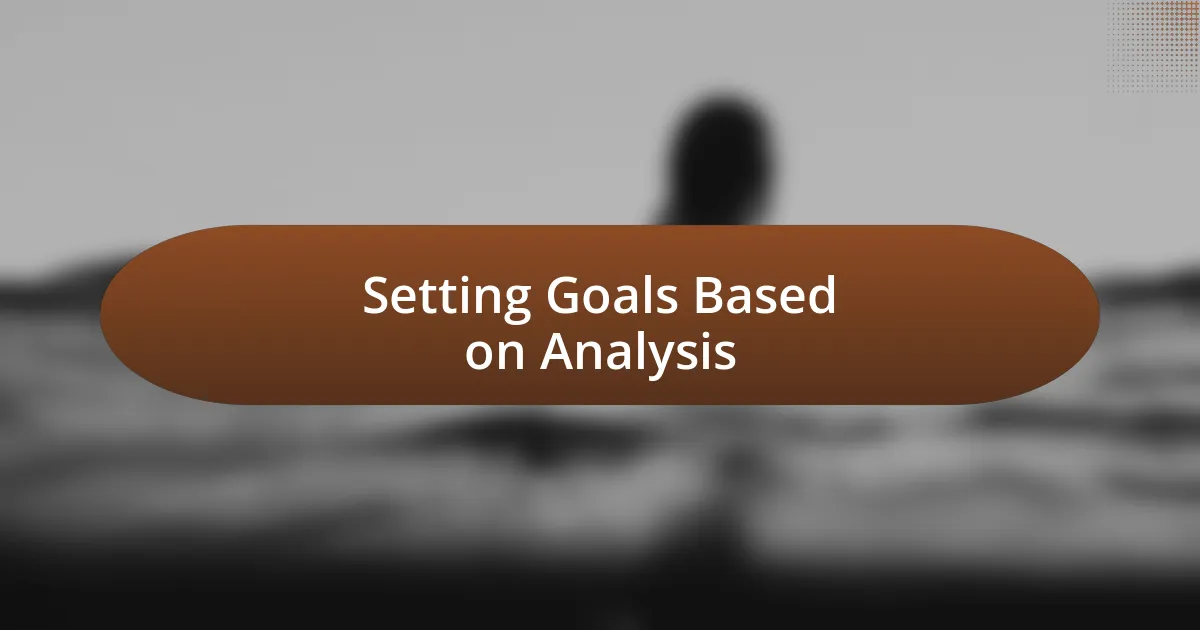
Setting Goals Based on Analysis
Setting goals is an integral part of improving based on match analysis. After analyzing my performance, I realized that pinpointing specific areas for improvement can be incredibly motivating. For instance, I once identified that my reaction time in high-pressure situations needed work. Setting a goal to complete daily drills focused on quick decision-making transformed not only my gameplay but also my confidence.
As I dissected my match history, I found it valuable to set both short-term and long-term goals. I started with measurable targets—like achieving a certain number of kills in a week—before shifting my focus to broader objectives, such as mastering a new character. It was enlightening to track my progress; seeing tangible improvements reinforced my commitment to my goals. How often do we overlook the power of tracking our achievements?
Moreover, I began to connect my emotional responses to different gameplay scenarios. For instance, I noticed that moments of frustration came from specific types of losses. By setting a goal to shift my mindset in those situations, I not only improved my gameplay but also started enjoying the process more. Isn’t it amazing how understanding our emotions can lead to a transformative gaming experience? This deep analysis and goal-setting approach has genuinely changed how I engage with my matches.


